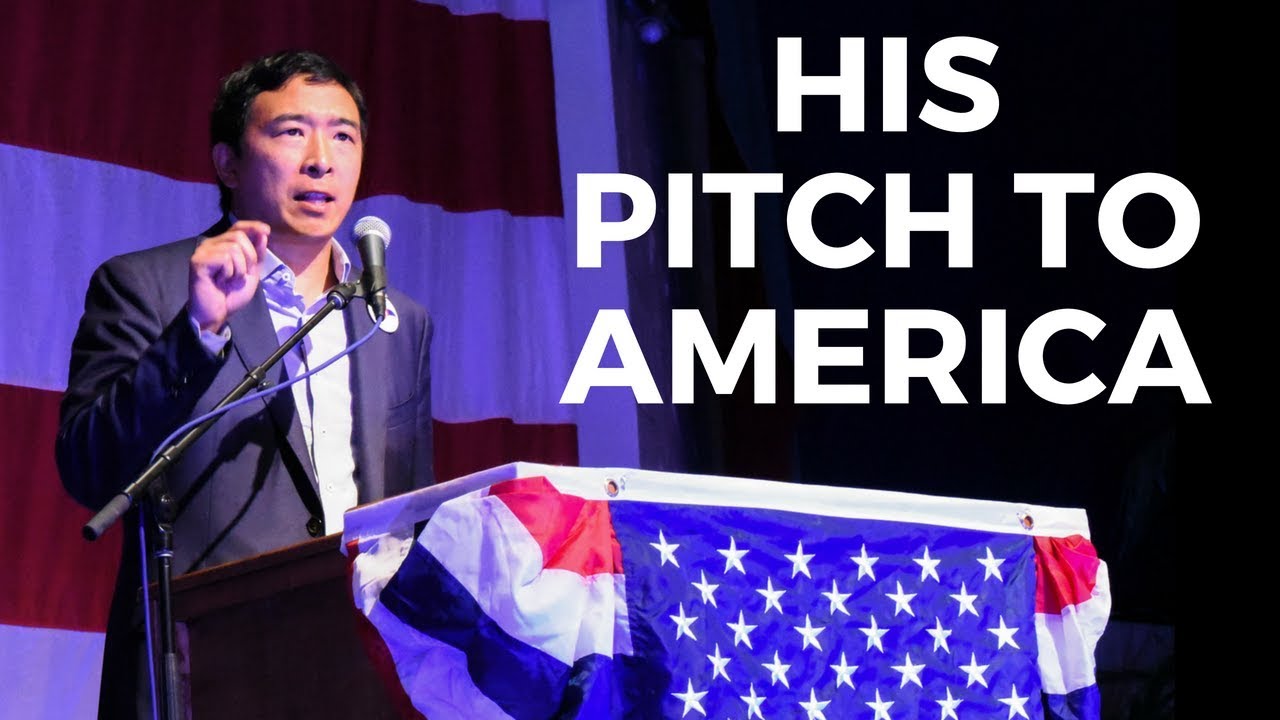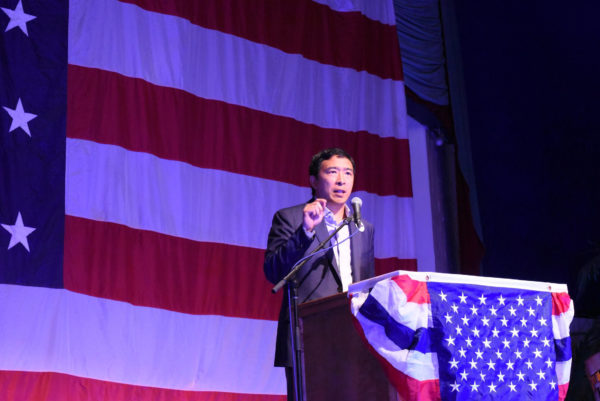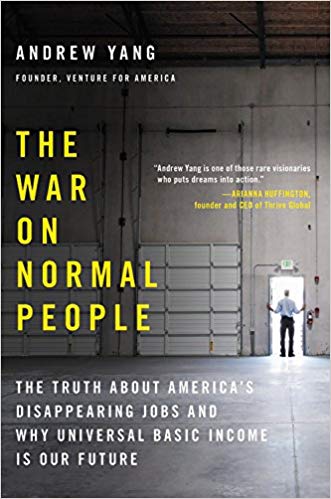Andrew Yang’s headline speech at the 2018 Iowa Wing Ding: “The opposite of a Donald Trump is an Asian man who likes math.”
This past spring, a Facebook friend posted a meet-and-greet event for Andrew Yang, a Taiwanese American running for president (yes, president of the United States) in 2020. I emphasize 2020, since I was kind of surprised someone would be running so early (Obama didn’t start running until February 2007 – almost two years before November 2008).
Unfortunately, I had a conflict and didn’t get a chance until July for another meet-and-greet, where I met Yang and scheduled a face-to-face, in-person interview.
I don’t think I had ever heard of Yang until that meet-and-greet post on Facebook, or if I had, I might have dismissed him, since I usually keep up on Asian American politicians – especially if they run for president.
Prior to interviewing Yang, I did some research and found an interesting New York Times article profiling him, interestingly titled “His 2020 Campaign Message: The Robots Are Coming.”
That candidate is Andrew Yang, a well-connected New York businessman who is mounting a longer-than-long-shot bid for the White House. Mr. Yang, a former tech executive who started the nonprofit organization Venture for America, believes that automation and advanced artificial intelligence will soon make millions of jobs obsolete — yours, mine, those of our accountants and radiologists and grocery store cashiers. He says America needs to take radical steps to prevent Great Depression-level unemployment and a total societal meltdown, including handing out trillions of dollars in cash.
To be honest, having graduated from college in the early 1990s, I had not heard of Venture for America (founded in 2011), which is essentially modeled on Teach for America, to take college graduates into areas of the country to help teach entrepreneurship – which after hearing one of Yang’s pitches from YouTube videos I’ve seen, made total sense.
“Humanity First” is Yang’s campaign tagline, and it may sound a little bit idealist and lofty, but at the heart I believe it’s Yang driving his main point to the level of campaign discussion: more and more automation is going to eliminate millions and millions of American jobs, so an economic imperative is to put humanity first and find a solution for those whose jobs will be eliminated (and automation is not going away).
In fact, Yang wrote a book on the idea: The War on Normal People – The Truth About America’s Disappearing Jobs and Why Universal Basic Income Is Our Future.
Yang studied economics at Brown University and then went to Columbia Law School, so he was always interested in politics in some ways before giving up on being a lawyer, quitting his first law job after a few months to be an entrepreneur during the original dot com wave in the late 1990s.
After leaving for Venture for America and Trump (“an immoral, corrupt, narcissist reality star”) getting elected, he really wanted to understand why Trump won, as he saw a massive signal that politics was broken at an institutional level. As part of Venture for America, Yang saw a lot of the country he had not seen before, and saw how economically challenged a lot of the country was.
Yang dug into the economic and voting numbers and the strongest correlation was automation eliminating jobs – in fact, he attributes 80 percent of eliminated jobs to automation – not trade or outsourcing or other issues. I find this pretty believable, especially on the manufacturing front. And with things like self-driving cars (and trucks), there will be even more job loss in the future. I know this will happen since I have several friends in Silicon Valley in the self-driving car and truck industry. Driving trucks is the most common job in over 20 to 30 states from what I recall (3.5 million truck drivers, 95 percent male, and 5 million in related jobs to the truck driving industry. Yang approached many Democratic political leaders and didn’t get the sense that they wanted to face reality or understand the true economic issue at heart.
Yang’s primary policy solution to address this issue is what he has termed, The Freedom Dividend:
A Universal Basic Income, “the Freedom Dividend,” of $1,000 per month, $12,000 a year for every American adult between 18 and 64. This is independent of one’s work status or any other factor. This would enable all Americans to pay their bills, educate themselves, start businesses, be more creative, stay healthy, relocate for work, spend time with their children, take care of loved ones and have a real stake in the future.”
According to Yang’s research, government sponsored re-training is 0 to 37 percent successful at transitioning from one industry to another – and less than 10 percent of Americans qualify for government sponsored re-training.
While I do believe Universal Basic Income (UBI) would help stabilize economically a lot of Americans (much like what Social Security has done for senior citizen poverty), $1,000 a month will help Americans make transitions where there have been a lot of studies on this – including the state of Alaska, which essentially has UBI – in the form of the Alaska Permanent Fund.
Yang is also for universal healthcare and Medicare for All (which I’m for), like most other industrialized countries have (like South Korea, Japan, and Taiwan). As Yang noted, the United States can afford universal healthcare because we already pay two times the amount on healthcare per capita for worse outcomes than most nations. As a former CEO, Yang had to deal with healthcare costs (health insurance benefits for his employees) as a major line item. 94 percent of new jobs created between 2005 and 2016 provided no healthcare and tying healthcare to employment makes no sense.
I also spoke with Yang about his background. His parents met as graduate students at Berkeley after studying in Taiwan, and now live back in Taiwan. Yang tries to visit them at least once a year. He was born in Schenectady, New York and grew up near West Chester and was one of the few Asian American kids in the area.
His parents were never interested in politics while he was growing up. His parents were initially concerned when Yang was interested in running for president, but were primarily concerned about his safety and have come around to fully supporting him now that he’s running.
Yang has also been reaching out toward the Asian American community, and was interviewed by YouTube stars the Fung Brothers back in June 2018. It’s an interview I wish I could do, but I’m not nearly as funny as the Fung Brothers. Kudos to them for the interview, and I hope they highlight more Asian Americans in public office or running for public office.
Yang is the first Asian American man to run for president as a Democrat. I compared Yang in many ways to an Asian American version of Bernie Sanders, and while he admired Sanders’s broad policy initiatives, Yang did seem to have an issue with the $15 per hour minimum wage, saying it would drive more companies, especially those in the service sector, to automate jobs even more quickly (as one is seeing at McDonald’s and elsewhere with self-service ordering kiosks).
Yang showed me his online donations, illustrating his broad support beyond the Asian American community. But he did also make the point that Asian Americans also need to step up and get involved, because the United States is not in good shape and needs to treat the core problems, not just the symptoms, and provide a different perspective. And Asian Americans need to be involved, because there is still a large segment of the United States that perceives Asian Americans as not fully American and in fact, foreign.
When I first met Yang at that meet-and-greet, he jokingly said that when people meet him and discover he is running for president, they think he’s from the future, which reminded me of this scene in Back to the Future when Marty McFly meets Doc for the first time and tells him when he’s from the future and that Ronald Reagan is president. But what Yang was really telling me is that Americans think he’s from the future because there’s never been an Asian American president in our history – and that can only happen in the future.
I compared Yang in many ways to Taiwanese American Jeremy Lin, where Americans had no concept of what an Asian American NBA basketball player could be. Yang brought up the fact that no one would believe that Obama could be elected president, and I admitted I was one of the cynical ones who didn’t think Americans were ready to elect an African American president.
Yang stated that Asian Americans are 5.8 percent of the nation’s population and the fastest-growing population group in the nation. With the highest levels of median income and education, there’s absolutely no reason why an Asian American can’t be president – which I absolutely agree with. I think with the success of Crazy Rich Asians helping to breakdown stereotypes, we really need Asian American representation in political leadership, and as President of the United States, to help instill the idea within Americans that an Asian American president is not only possible, but is one day inevitable.
Yang also made a great point that if one waits through the traditional channels and pipeline of presidential candidates, which is usually through the senate or governor of a state, we’re going to be waiting a very long time. And that an Asian American president is just as likely, if not more so, to come from non-traditional routes like Yang has traveled. That made sense to me – since I had high hopes that the California state treasurer would make it past the California open primary and then be elected Governor of California, and later run for President of the United States. If we have to wait for another John Chiang out there, we might be waiting a long time. We all know that Trump ran as an outsider, and as a successful business person, who was elected president.
Yang said he would be leaving the San Francisco Bay Area soon to co-headline an event in Iowa, where the first caucus in the nation in the presidential election year occurs. His speech is embedded at the top of this blog post, where he does discuss the Freedom Dividend, and universal healthcare, but also measuring our economy beyond GDP (like metrics such as childhood success rates, mental health and freedom from substance abuse, environmental quality, median income and wealth, and proportion of elderly in quality care that can retire in dignity) – an American scorecard that he would present annually in the State of the Union address.
I really enjoyed sitting down with Yang for over an hour discussing his campaign. He’s smart, articulate, fact driven, personable and can be funny with a great sense of humor. Yang has a long way to go before capturing the Democratic nomination and actually being elected president. First and foremost is building that name recognition. Having been born and raised in Massachusetts, I had heard and was aware of Senator Bernie Sanders of Vermont, and met him in Silicon Valley around 2010. He had very little name recognition when he first started, but articulated ideas that resonated with the electorate – and I’m hoping Yang can do the same – if only to help imprint the idea that Asian Americans can be political leaders (and leaders more broadly in an American society).
If you want to learn more about Yang, check out his website at https://www.yang2020.com.










